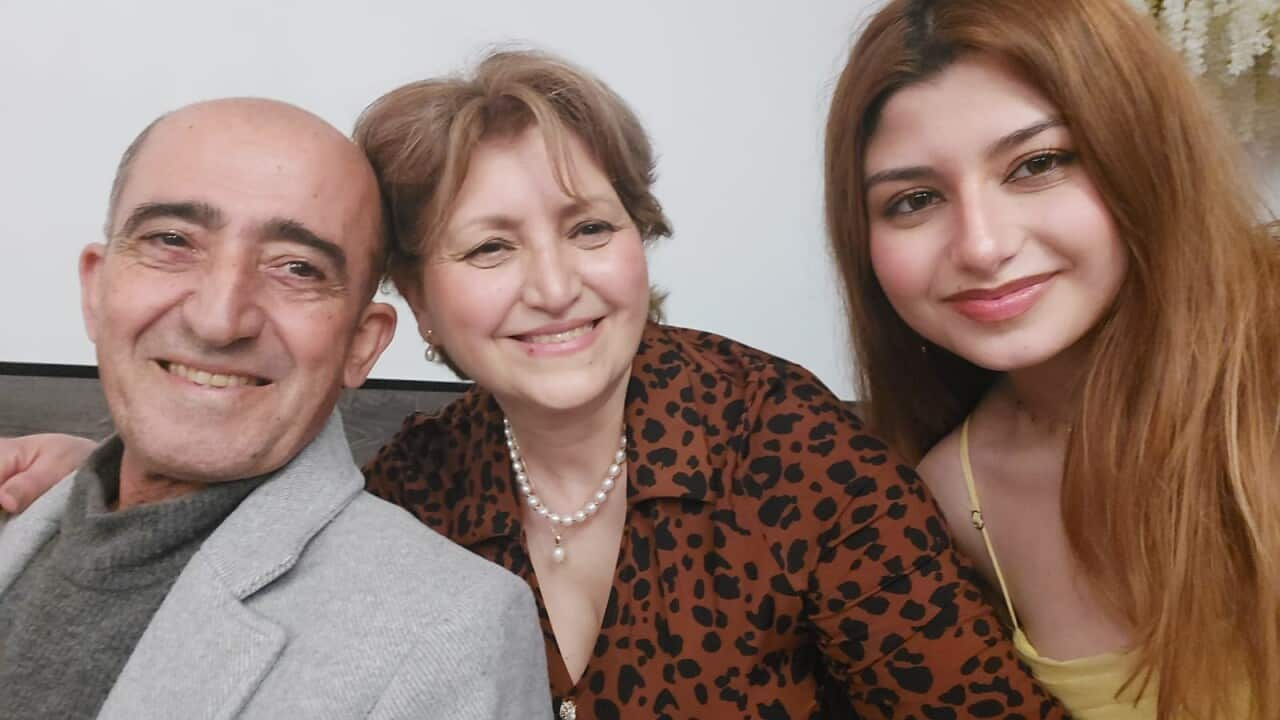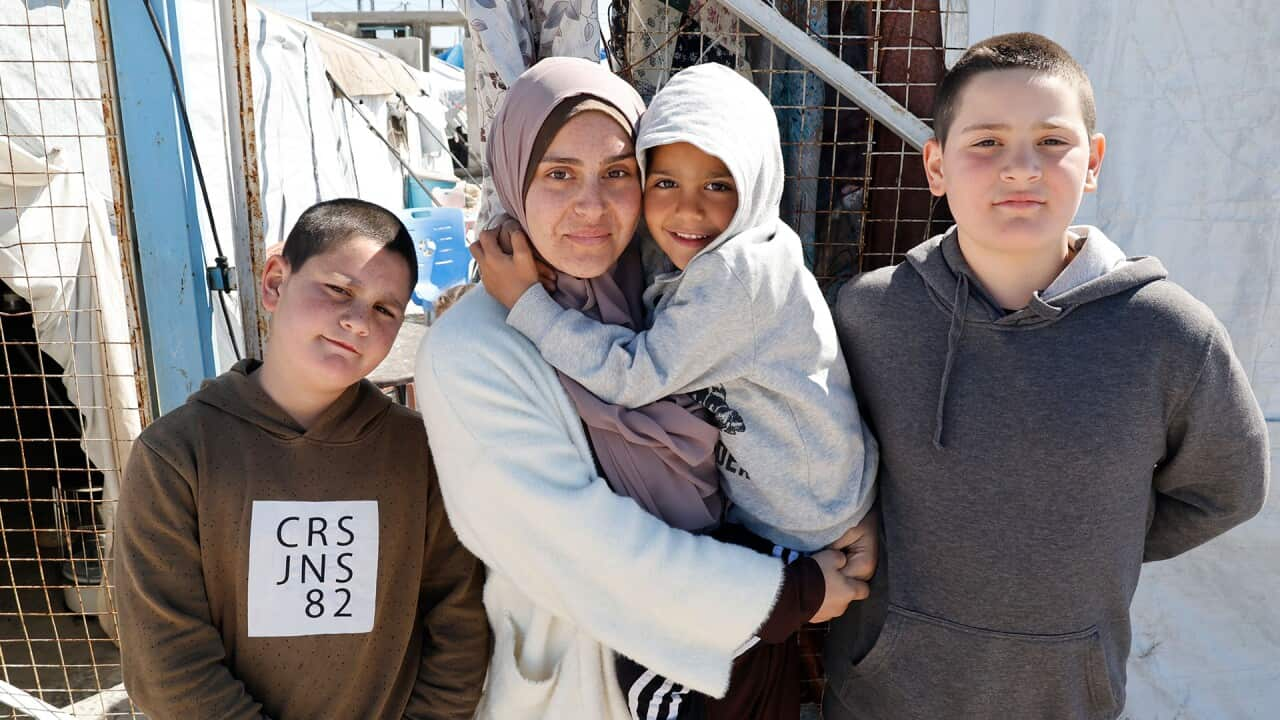Hala Akram Abou Hamdan remembers her father as a happy and resilient man, who had always dreamed of a "free Syria".
"A very happy man, through the pain, through the struggle. He's always been smiling," she told SBS News.
Akram Abou Hamdan and his family arrived in Australia as refugees 10 years ago, after he was forced to flee to Jordan — a country neighbouring Syria.
Last week, Akram died at the age of 64.

Akram Abou Hamdan died last week, his family told SBS News. Source: Supplied
"My father always dreamt of this moment, and it felt like a fight. His fights and sacrifices were a part of the journey to get there," Hala said, on behalf of her family.
"While losing him hurts deeply, I feel proud of everything he stood for — and everything he gave to others. Dad was one of the many Syrians — he was not the only one — who put everything on the line to see Syria be a free, democratic country one day."
For Hala and her family, hearing of the fall of Syrian President Bashar al-Assad's government following a rapid rebel offensive was "bittersweet".
"It's quite difficult for us knowing that he wasn't able to see Syria free like he wanted to before his death," she said.
"It feels like we have something really big, but then we lost something against it.
"But it feels good that Syria is finally free. I don't know if we can fully celebrate it."
Collapse of Assad regime brings celebration for many
Bashar al-Assad after rebels swept into the capital, Damascus, on Sunday, .
Closer to home, celebrations began in western Sydney on Sunday night as members of Australia's Syrian community took to the streets, handing out sweets and letting off fireworks.
A flag, which appeared to be that of al-Qaeda, was seen during a celebration in the suburb of Greenacre.
"The regime of the al-Assad family — firstly under the father, Hafez al-Assad, and for the last 20 years or so, under his son Bashar al-Assad — has effectively been in control of Syria for the last 50 years," explained Melbourne University's postdoctoral fellow Marika Sosnowski, who researches local/rebel governance and legal systems in Syria.
"It has ruled Syria with an iron fist. Syria was known as a kingdom of silence. People could not speak freely. Political freedoms were basically outlawed. There was no freedom of assembly, no freedom of speech, human rights were completely abysmal under the Assad regime," she said.
When the Arab Spring reached Syria in March 2011, peaceful demonstrations broke out calling for change.
Assad, who was also commander-in-chief of the armed forces, responded by ordering a brutal crackdown on the protesters and civil war swiftly ensued.
More than five million of which more than 30,000 resettled in Australia.
Akram's story
Hala's family is from the city of as-Suwayda in southwestern Syria, and is part of the Druze minority group. While Lebanon has the largest concentration of Druze, Syria is said to have the largest total population, up to an estimated 700,000 in the early 2020s.
Hala said her father was known for his "position against corruption" in Syria.
He and his wife Joumana Charaf owned a food distribution business. When the war started, refugees from other parts of the country began fleeing to their city for safety.
"As a result of the war, lots of people were migrating to our city from unsafe cities. They were women and children, and he dedicated his life to helping those in need, providing them with shelter and food from his business — along with other kind-hearted individuals who decided to volunteer," Hala said.
Hala said her father was "seen as a target" by the Assad regime as a result of this work, and received "countless threats to stop him from helping those in need".
"He continued, but had to move to a nearby country. Even so, he never once thought of giving up his dream," she said.
Three years after arriving in Australia, Akram and Joumana took over a shop on Melbourne's Lygon Street. Among those packed with Italian cannoli, the business, known as Trio Pasta, Sweet & Nuts, became Trio Palmyra — bringing the Syrian family's baklava to Melburnians.
"The family is continuing to work there," Hala said.
"We want to continue on the dream that he's always had — keep pushing, regardless of what the circumstances are."
'A whole new world has opened up'
Dr Said Ajlouni is a member of the Australian Syrian Association, which was set up when the civil uprising began in 2011.
He said the reaction among his community is "happiness, joy" and disbelief.
"In fact, it was beyond imagination. Talking about the last 50 years .... and since 2000 Bashar started as leader, we had lost hope, almost," he said.
"Overall, currently, we feel that it [the regime] is over, Syria has been freed, and the Syrian people — and other Arabic people from different communities — are very pleased and happy."
Sosnowski also argues the recent events are a "very welcome change for Syria — and anyone who has had anything to do with Syria in the last years".
Both Ajlouni and Sosnowski said the fall of the regime will also impact Syrians living in Australia, despite their differing circumstances.
"A whole new world has just opened for so many Syrians now with the fall of the regime and their ability to go back to their homeland — to see friends, family, neighbours, to visit the graves of their relatives," Sosnowski said.
"This is all really important for them — and also to help rebuild the country. There is so much knowledge in the Syrian diaspora, and among Syrians."
However, questions remain about what happens next.
"The mood is extremely joyous. What the future brings, we don’t know," Sosnowski said.
Assad's departure comes less than two weeks after the Islamist Hayat Tahrir al-Sham (HTS) group
On Sunday, Prime Minister Mohammed al-Jalali said he was ready to cooperate with "any leadership chosen by the Syrian people".
HTS formed under the name Jabhat al-Nusra in 2011 as a direct affiliate of al-Qaeda. Despite officially cutting ties in 2016, it is still listed as a terrorist group by many governments, including Australia.
The government calls HTS a Sunni Islamist religiously-motivated violent extremist (RMVE) group based in north-western Syria.
Sunni Muslims are believed to make up about 70 per cent of the 23 million population, Alawites — an offshoot of Shia Islam — about 10 per cent, and there are substantial communities of Christians, Kurds, Druze and other religious or ethnic minorities.
Falah al-Lawandi, a member of the Shia community, told SBS Arabic:
"We can say with absolute confidence that we are against what happened in Syria, we know what will happen. We know who will lead this change and we know they came to exclude the Shias."
Rebel commander Anas Salkhadi appeared on state TV, saying: “Syria is for everyone, no exceptions. Syria is for Druze, Sunnis, Alawites, and all sects.”
Ajlouni said he is eager to see a free Syria "which is Syria for everyone, aside from ethnic background, religion", arguing the Assad regime "tried to break that philosophy".
Sosnowski said she hopes the original cry of the Syrian revolution is one that can "now spread across, not just the Arab and Middle Eastern world, but across the world, and Syria can become a beacon of hope again for many people living under authoritarianism or dictatorships".

Akram Abou Hamdan pictured with his family. Source: Supplied
"Now I want to get to know my country," she said.
In the meantime, she'll carry her father's message.
"His final message was really, keep smiling, keep being positive. Work very hard towards your dreams and be very confident," she said.
"I wish Syrians can finally be happy."
This story has been produced in collaboration with SBS Arabic.






